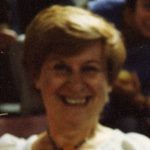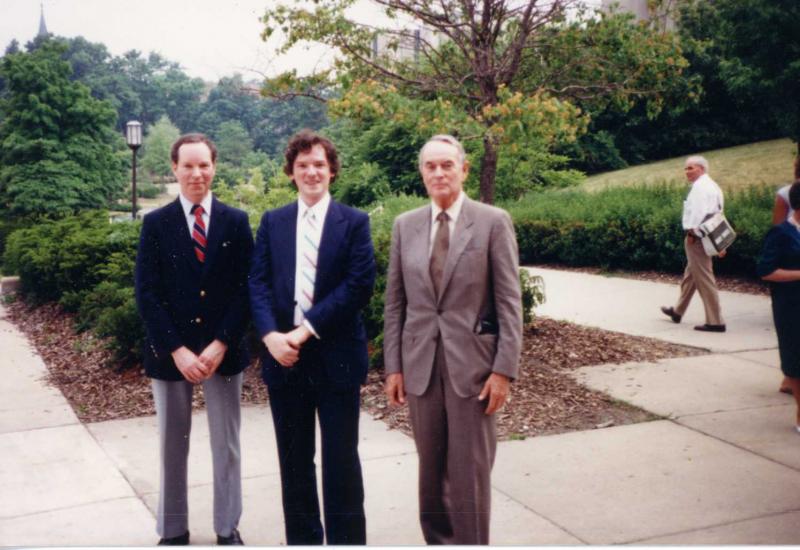Myrtha Perez & Arrand Parsons


Myrtha [Myur-tha] Perez was an Uruguayan concert pianist, but when I met her in 1974 she was Head of Recreational Therapy at Chicago’s Children’s Memorial Hospital. She had married a doctor through whom she got the position, but whom she divorced when he started planning her concert programs and telling her how to live her life. I volunteered at the hospital from 6-9 every Wednesday evening, playing board games with the kids (0-16 years), reading them stories, and teaching them rudiments of piano and guitar. My friends thought I was a great pianist, but they knew even less about music than I did, and since I was mostly self-taught I wanted a professional opinion. I had been out of touch with Myrtha for about 10 years (I had stopped volunteering and was focused on becoming a novelist), but I found she lived just a block from me and I asked if I might play for her sometime. She invited me to her place, we had tea and chocolates and cheese and crackers before I played her my compositions.
She said I had good ideas (themes, melodies), no problems with inspiration and improvisation, it would be a waste not to pursue music, but if I was to be any kind of composer I needed less monodony (not just one singing voice but many voices in concert). I needed to learn harmony and counterpoint. Not to worry: what I knew was innate; what I didn’t know I could learn. She played me snatches from Bach’s Chromatic Fantasy, Schumann’s Fantasie in C, and Franck’s Violin Sonata to illustrate her point. She also gave me two tickets to a symphony concert and the telephone number of Arrand Parsons, a music professor at Northwestern University who also wrote program notes for the Chicago Symphony Orchestra, cautioning that he would be too busy to teach me himself, but would recommend a graduate student in his place. I thanked her, I needed to finish my novel first, after which I said I would contact Mr. Parsons.
The last time I saw Myrtha was in 1992 at a party given by her sister (Neri Martinon, wife of Jean Martinon, the conductor) to celebrate a successful surgery, the removal of a cyst from her pancreas which (she bragged with a smile) had held a tumor the size of an orange. Unfortunately, she succumbed later the same year.
In the meantime, I had published my first novel, started a second, and called Arrand Parsons who had retired and offered to teach me himself. I visited him for hourly lessons every second Sunday afternoon, but it wasn’t unusual for the lessons to last almost 2 hours. More than anything I learned 3 and 4-part harmony, sometimes his wife would prepare a sandwich lunch, other times he would take me to a symphony concert (his wife preferred baseball games), a lovely gentle patient man to whom I owed so much more ultimately than music lessons.
Through the last 8 months of 1988, I developed the habit of alternating weeks between Arrand’s homework and my second novel, only to realize finally the novel needed my full attention and I took a break from the lessons. Arrand continued to invite me on occasion to concerts, but the novel went nowhere (I didn’t know enough, neither about the novel nor the craft—worse, I didn’t know how much I didn’t know). It’s a separate story how I got started on a new book, TRIO (about the Schumanns and Brahms) and I’ll save it for another time, but I called Arrand for access to his music library. He not only gave me access, but suggested I visit the music library at Northwestern University, among the most extensive in the country.
I hit my first roadblock as soon as I got to the library: it was available only to faculty and alumni. I was neither, but asked them to call Arrand and was awarded the keys to the kingdom. I stepped into the library as if into a different world, so entranced I no longer remember whether my memory of the place is real or imagined, but it seemed located a few steps below ground level, not unlike a wine cellar, flagstoned, organized alphabetically by composer, bookshelves towering above and around me like rows of giant dominoes. Confronting the Brahms shelves, I was overwhelmed. They stood 6′ x 4′ holding nothing but books on Brahms. I despaired of ever getting through them all, but was gratified to find two-thirds were in German and French, taking them out of consideration (I speak neither language). Even so I gathered almost 20 books, barely able to see my way back to the front desk, when I hit my second roadblock: not even faculty and alumni were allowed to take books out of the library.
Again I asked them to call Arrand and again I was blessed by powers I had not dreamed Arrand possessed. There was nothing for it then but to get on with the business of the book and the business of the book took the next 16 years. I’ve mentioned this before in another context, but it bears repetition. I quit my job, lived on savings, lost 20 pounds in the 3 years during which I wrote the first 1,800-page draft in my writer’s cell (a studio with a view of a brick wall)—but was gratified by the subsequent recognition: an endorsement from Zubin Mehta, inclusion in Kirkus Reviews listing of Best Books of 2016, and a chamber opera adapted from the book by the Fresco Opera Theater of Madison, WI. My one huge regret: Arrand did not live to see his kindness bear fruit.